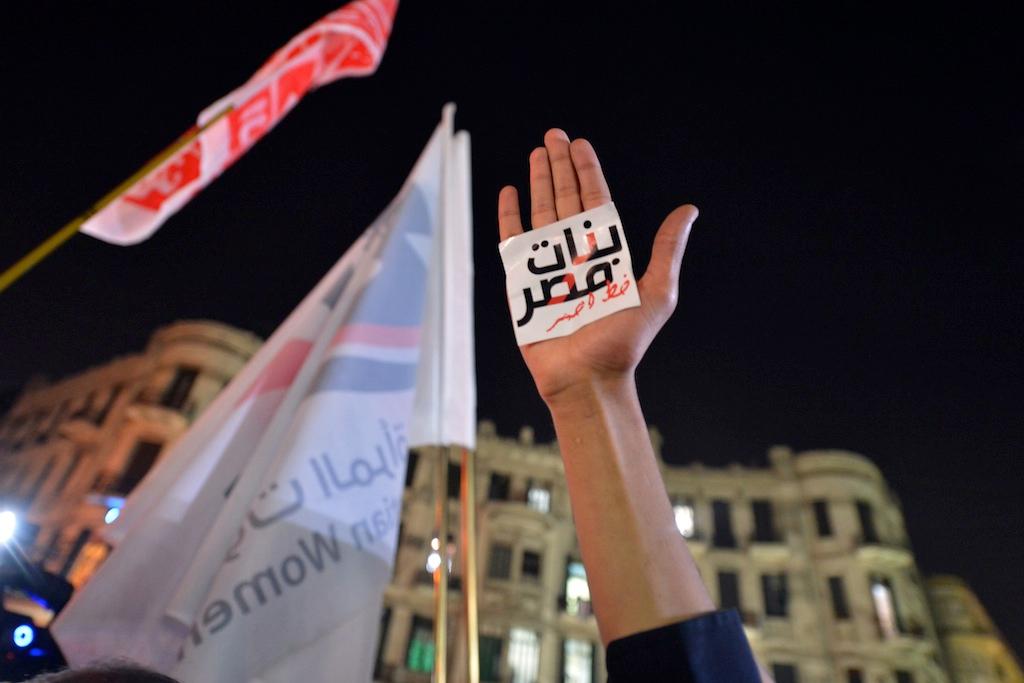Egypt’s women revolt against mass sexual assaults
An Egyptian protester hold up his hand with a slogan reading in Arabic: “Egyptian girls are a red line” during a demonstration in Cairo against sexual harassment on February 12, 2013. Egyptian protesters took to the streets again to demand an end to sexual violence, as campaigns against the repeated attacks in central Cairo pick up steam. Sexual harassment has long been a problem in Egypt, but recently the violent nature and frequency of the attacks have raised the alarm.
On Tuesday night, demonstrators around the world rose in solidarity to protest violence against women in Egypt.
The global movement, dubbed “Global Protest Feb. 12,” was scheduled in 24 cities throughout Egypt and outside Egyptian embassies in cities such as Khartoum, Melbourne, London, Amsterdam and New York, the Daily Star reports.
The Uprising of Women in the Arab World issued a statement Monday in coordination with the day of protest.
“We, citizens of all nationalities all around the world, will not watch in silence the spreading epidemic of sexual terrorism. We want to show our support, solidarity and admiration for the assaulted who paid the price of the ongoing Egyptian revolution with their own flesh, and to the heroic volunteers who are risking their lives for a safe Tahrir," said the statement.
The effort is linked to a larger surge of activism prompted by the mass sexual assaults against female protestors in the vicinity of Tahrir Square since 2011.
In Cairo, as many as 1,000 people took to the streets, beating drums, blowing whistles, brandishing signs and chanting slogans like, “Harassment won’t help you, think about it and we’ll cut off your hand,” and “Egyptian women and girls are a red line,” Daily News Egypt reports.
More from GlobalPost: A conversation with two Egyptian feminists
Yesterday's demonstration took place in Tahrir Square, in open dissent of the Egypt Shura Council Human Rights Committee’s recent suggestion that women are responsible for their own sexual harassment, and should confine their demonstrations to limited ‘safety zones.’
“A woman who joins protests among thugs and street inhabitants should protect herself before asking the Ministry of Interior to offer her protection,” Adel Afifi, a prominent board member of the Salafi Party Al-Asala, is quoted as saying by Daily News Egypt.
Tuesday’s protest is an assuring testament to activist groups’ resiliency and diehard commitment to justice in the face of pervasive violence. But according to the Egyptian Center for Human Rights (ECWR), statistical trends betray a harsh reality.
“We are moving backward,” says Nehad Abou El-Komsan, chair of the ECWR. According to the ECWR annual report, Egypt ranks first among countries witnessing a decline in the political status of women. Only one woman holds a seat in the current cabinet of Prime Minister Hisham Oandilm, which was the same situation “60 years ago during President Nasser’s time,” El-Komsan told Ahram Online.
The 2012 Global Gender Gap Report dropped Egypt three places this year – to 126 out of 135 ranked nations – as a result of a “worsening perception of wage equality between women and men” and for similar work and “decrease in enrolment in secondary education.”
More from GlobalPost: 5 human rights issues Egypt must address
The demonstration across Egypt was accompanied by a second protest, staged by low-ranking police officers. Hundreds of officers joined the ranks of the activists they have formerly faced off against, hoping to call attention to the “political exploitation” enacted by the government of President Mohammed Morsi.
Police officials, demanding an end to recurrent attacks on officers and their lack of arms, shut down headquarters of the Interior Ministry in approximately seven provincial capitals, the Associated Press reported.
“Police and civilians are falling every day, and it needs to stop,” Ahmed Al-Helbawi, a leader of the police union, is quoted as saying by the New York Times. “We will not bear the responsibility of the political failure to contain the situation,” Al-Helbawi insists.
Ahmel Gamal, coordinator for the coalition of low-ranking police officers, claims the boycott should push government to respond to demands for higher wages, medical care, and protection. Many police officials have continued their protests through Wednesday, calling for the removal of Mohamed Ibrahim, and an agreement that allows officers to carry guns, Reuters reports.
For more of GlobalPost's coverage of women in post-revolutionary Egypt, check out our Special Report "The Voice and the Veil: Egypt's Revolutionary Women."
We want to hear your feedback so we can keep improving our website, theworld.org. Please fill out this quick survey and let us know your thoughts (your answers will be anonymous). Thanks for your time!
